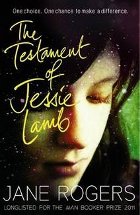The testament of Jessie Lamb by Jane Rogers

Canongate, 2012. ISBN 0857864181.
(Ages: 12+) Recommended. Dystopian. Just when you think no other
interpretation of our bleak future is possible, then along comes
this riveting story of a young girl, involved in the fringes of
several protest groups, wanting to do something about the women
dying, anything to save the world, to stop its descent into
nothingness. Women are dying of MDS (Maternal Death Syndrome) once
they get pregnant. It has happened suddenly, a girl at school has
become pregnant and several days later the school is having a
memorial service, Jessie's aunt dies, women are told not to get
pregnant, everyone has a birth control implant, and abortion
services are made readily available.
The story begins in a locked house, Jessie is handcuffed and secured
to the bed by her father while he tries to talk her out of her
decision. By degrees she reveals what has happened, both to society
at large and to herself as she tries to get her head around the
disease and its beginnings. Several of her friends say it's the
scientists' fault, they have simply gone too far, and so protest
against science; others blame the airports and besiege them; others
target the laboratories where animals are being used in experiments.
Some women aggressively target scientists and their use of women, as
the root of all problems.
But Jessie is unconvinced, and so internally digests all that is
going on around her. When societies try to have children born in a
way that keeps the foetus alive, but still kills the mother, Jessie
is excited as her scientist father explains. She feels that there is
something she can do. All her friends are involved in protests, but
she feels impelled to become pregnant and carry the child to term,
as she dies. She will die to bring a child into the world. She is
convinced that she is doing the only thing possible, that she is
sacrificing herself for the good of her society. When her father's
laboratory announces that they will use the frozen embryos stored
around the world in IVF laboratories, and calls for volunteers to
house them, Jessie volunteers.
Her testament to her unborn child seeks to explain just why she has
done this, and in doing so the reader can in part feel the reasons
behind some people's impulse to join causes which may result in
their deaths. Symbolism abounds: Jessie's name, the significance of
the lamb, a virgin (almost) birth, the woman being the vehicle for
one to come, and so on, all have cadence in the stories of heroes.
The theme of martyrdom is also too strong to ignore, and many
discussions will ensue in classrooms studying this book.
Fran Knight